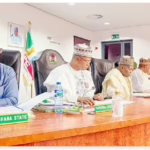Cross River State Demands Accountability After the Death of Young Man in Calabar
Family Seeks Justice for Moses Mba’s Untimely Passing
The government of Cross River State has expressed deep sorrow over the recent death of 21-year-old Moses Mba, whose family continues to call for a thorough investigation and justice. Moses, who was approaching his 22nd birthday in November, succumbed to injuries sustained after an altercation involving security personnel linked to the former residence of Governor Bassey Otu.
Mrs. Victoria Mba, Moses’ mother, recounted the harrowing events to the News Agency of Nigeria (NAN) in Calabar. She alleged that on August 1, her son was violently assaulted and shot by security aides stationed at the governor’s previous home. Moses later died on August 9 at the Naval Reference Hospital in Calabar due to complications from the injuries.
Details of the Incident and Family’s Account
According to Mrs. Mba, the confrontation occurred when Moses insisted on delivering what he described as a divine message to the governor. “My husband and I were away in Abia when this happened. Upon our return, a Red Cross official informed us that Moses had been rushed to the hospital,” she explained.
She added, “When we saw him, he told us he only wanted to meet the governor to share a message from God. Moses had been devoted to spiritual matters since childhood, often speaking of visions, but we always encouraged him to finish his education first.”
Mrs. Mba also criticized the security personnel for their lack of intervention to save her son’s life. She praised the nearby Red Cross office for their prompt response, noting that they covered over ₦1.3 million in medical expenses, including surgery on Moses’ left leg where he was shot.
Hospital Surveillance and Intimidation Allegations
The grieving mother further revealed that throughout Moses’ hospitalization, plainclothes security agents allegedly monitored the hospital vigilantly, rotating shifts around the clock. She identified one individual, Emmanuel Dickson, an aide to the governor’s Chief of Staff, who maintained contact with the family and visited the hospital.
Mrs. Mba claimed that these operatives demanded all medical receipts despite the Red Cross covering the costs. After Moses passed away on August 9, she said she informed Dickson about the mortuary fees amounting to ₦54,000, but only ₦50,000 was provided.
She lamented, “Now, they threaten us, insisting there is nothing we can do because the governor is involved. They even tried to access Moses’ body at the morgue, led by the state’s Commissioner of Police, but we refused.”
Family Denies Claims of Mental Instability and Pleads for Support
Mrs. Mba strongly refuted allegations that her son had mental health issues. She highlighted Moses’ academic achievements, including a 196 score in the recent JAMB examination and excellent WAEC results. He was set to study Business Administration at the University of Calabar.
She appealed to the public for assistance, stating, “They say all I want is money and that ₦3 million will silence me. Nigerians, please help me. I want justice for my son, who is still lying in the mortuary.”
Official Responses and Ongoing Investigation
In response, the Cross River State government condemned the violent incident that led to Moses’ death but denied direct involvement by the governor’s security team. Mr. Erasmus Ekpang, the Commissioner for Information, clarified that the location was the governor’s former residence, not his current official home.
Ekpang stated, “Only one security officer was present when Moses arrived. Video footage shows him throwing large stones at the officer. He was not mentally stable and even apologized for his actions. Nonetheless, we strongly denounce the use of excessive force.”
Similarly, the Commissioner of Police confirmed that the case has been submitted to the Director of Public Prosecutions (DPP) for further legal guidance. “We will proceed according to the DPP’s recommendations,” he affirmed.
Context and Broader Implications
This tragic event highlights ongoing concerns about the conduct of security personnel in Nigeria and the need for transparent investigations into incidents involving state officials. According to recent data from the Nigerian Human Rights Commission, complaints about excessive force by security agents have increased by 15% in the past year, underscoring the urgency for reforms.
As the family awaits justice, the case serves as a somber reminder of the delicate balance between security enforcement and human rights protection in the region.


















0 Comments